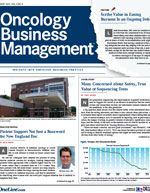Publication
Article
Oncology Business News®
Saying Hello to Dolly and a Hoped-for Goodbye to Bureaucracy
Author(s):
Today, scientists continue to work on cloning technologies with the hope that someday we will be able to offer new body parts to people afflicted by disease and injury.
Andrew L. Pecora, MD
Editor-in-Chief of Oncology Business Management
Chief Innovations Officer, Professor, and Vice President of Cancer Services John Theurer Cancer Center at Hackensack University Medical Center
President, Regional Cancer Care Associates, LLC
No, I will not be addressing the Broadway show that debuted in 1964; it is the other Dolly, the 4-legged sheep that I plan to discuss. On July 5, 1996, investigators from the Roslin Institute in Midlothian, Scotland, were the first to have a sheep born live from a ewe’s ovum whose natural nucleus was replaced via nuclear cell transfer with the nucleus of a mammary gland cell from another adult sheep. The cloning process received international praise as a revolutionary breakthrough, but it also stirred up much concern and controversy because of the ethics of cloning. Today, scientists continue to work on cloning technologies with the hope that someday we will be able to offer new body parts to people afflicted by disease and injury.
I could write pages about the elegance of the science of cloning, but instead I want to address how the term cloning has been hijacked and now carries a negative connotation in medical documentation. Physicians, having realized that it is in the best interest of patients and society to move from paper to electronic records, are now facing unexpected regulatory scrutiny over “how similar” their current medical notes may be to prior ones. This is because physicians naturally do a degree of cutting and pasting to save time. However, it is important to point out that physicians are paid to provide competent and compassionate care, not to write original notes. Clearly, a note must contain enough information so that providers have all the background information they need to continue proper care for the patient. Notes need not be Pulitzer Prize material, though it seems as though regulators want to judge them based on freshness and originality, rather than accuracy, continuity, and medical relevance. Are they kidding us? With the time saved by copying my prior note and editing my impression and plan, I can spend an extra few minutes with the patient, talking to them about the kids, or giving them a hug. What could possibly be wrong with that?
Physicians are worried that this new emphasis on original note writing may place them in economic peril by forcing them to spend more time at the computer, just so an auditor is happy. Now, let’s see: are there auditors who check the originality of every legal document that I pay for? Of course not, though it is commonplace for attorneys to reuse so-called boilerplate verbiage. Or, how about in the automotive industry, on the assembly line? Should we demand that every car be an original and that they not be cloned? This, too, would be silly.
Wasn’t the idea behind electronic health records all about saving time for physicians? Do we want our doctors to be focused on the note or the patient? Do we want to increase efficiency, reduce redundancy, and eliminate unnecessary care variance, or do we want original notes every time? I do not believe original notes are compatible with these other worthy objectives. I would rather we put a camera in every exam room so that auditors can observe the care that we give and judge from that instead of how many words are different note to note.
Dolly, you were an original even though you were cloned. Let’s hope regulators pay more attention to things that really matter.










